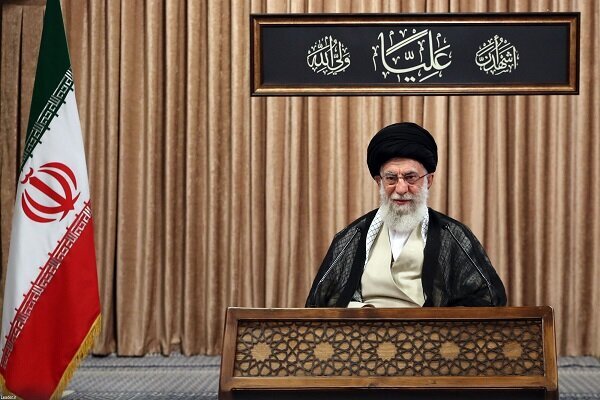Leader underlines high voter turnout in the upcoming elections

TEHRAN— The Leader of the Islamic Revolution spoke with the people in a live televised speech, broadcasted by state TV Channel One, social media platforms, and networks abroad.
The Leader began his speech by honoring Imam Ali, lauding his "vast and unbiased" justice, bravery, and kind heart. He described Imam Ali (PBUH) "as solid as a mountain" in terms of mannerisms.
Noting the devotees the Islamic Revolution has trained over the years, he exemplified late Gen. Soleimani, stating that he was seeking martyrdom.
"When the enemies threatened to murder martyr general Soleimani, he said that they are threatening me with something I have been seeking for a long time (martyrdom)."
'Martyr Motahari produced thoughts, as well as spreading them'
In the second part of his speech, the Leader praised the work of the teachers and loving mothers during the coronavirus pandemic and lauding martyr Morteza Motahari, whose martyrdom is marked on May 2, which is known as the Teacher's Day in Iran.
He described Motahari's characteristics as a person who produced thought as well as spreading them. He referred to the late martyr as an active, dynamic person whose concern was to do his duties at their best.
The Leader advised teachers to pay attention to the thinking of their students and their audience. He remarked the national education system as one of the fruits of the Islamic Revolution, thanking teachers for being a part of this national education system.
"The teachers are the officers of the progress army," he highlighted.
The Leader called on the government to improve the livelihood of the teachers.
'Production depends on the workers'
Speaking one day after the International Workers' Day, the Leader of the Islamic Revolution praised workers, referring to them as the backbone of a "production-based" economy. He called on the media to pay more attention to the workers.
'Improving domestic production makes sanctions ineffective'
On the issue of sanctions, the Leader stated that the best and most effective way to make sanctions ineffective is to improve domestic production.
He remarked, "If we improve domestic production and follow up on it, the sanctions would become ineffective, then lifted."
'Election is an opportunity'
On the issue of the elections, he described the elections as an opportunity and stressed that the people should not be in despair.
The Leader highlighted the fairness of the elections, stating that the elections have all been fair and square in the history of the Islamic Republic.
"Elections are the presence of the people, and when the people are present, no power can shake the establishment," he noted.
He stressed that the elections should not be ruined by vain talks and deceptive promises by candidates who are not aware of the country's current status.
'West wants to dominate Iran's foreign policy'
Elsewhere in his remarks, the Leader touched on the foreign policy issue, stating that Western countries dominated Iran's foreign policy during the reign of the Pahlavi dynasty.
"Then came the revolution and rescued Iran from the West's reign. They, whether the United States or Europe, have been trying for 40 years to dominate Iran," the Leader remarked.
Explaining why the U.S. and Europe are angry with Iran, Leader said that the independence of Iran from their reign angers them.
"We communicate with China, they (the West) get angry. We try to make dialogue economically or politically with Russia, they get angry. They enter and put our poor neighbors under pressure. We have witnessed these things."
The Leader said that there are examples of leaders of Arabic and neighboring countries who wanted to travel to Iran, yet they changed their minds since the U.S. officials contacted them and prevented them from making dialogue.
The Leader stressed, "They oppose all of our diplomatic moves. We cannot be passive and act on their will. We need to be dynamic, independent, and strong."
He also highlighted the importance of the Quds force as the most crucial element to prevent "passive diplomacy" in West Asia.
SA/AJ
Leave a Comment